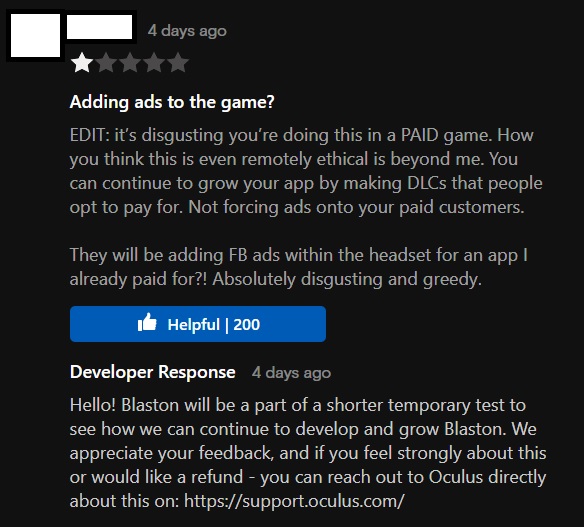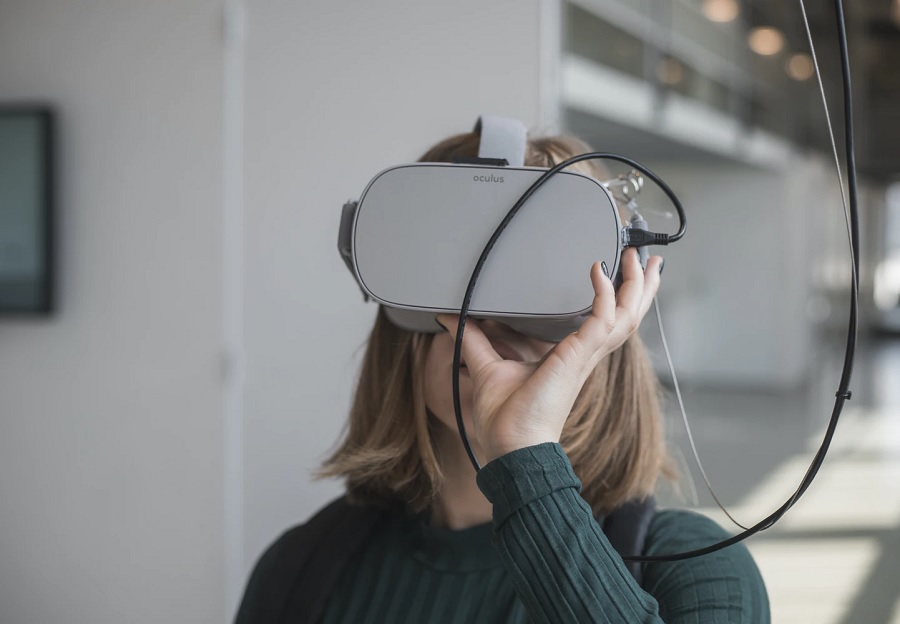Resolution Games announced it is no longer running Facebook’s advertisement test on its virtual reality game “Blaston” after being hounded by negative reviews. However, the developer clarified it is not completely backing out of the ads experiment.
“After listening to player feedback, we realize that ‘Blaston’ isn’t the best fit for this type of advertising test,” the developer wrote on the game’s official Twitter page on Monday. “Therefore, we no longer plan to implement the test.”
To those not familiar with the game, “Blaston” requires an online connection to let players duel with bots and other players using their assembled loadout weapon. The game offers tournaments and various game modes, including arcade matches. It is sold for $9.99 on the Oculus Store and Steam.
However, Resolution Games also clarified it is not completely backing out from the Facebook ads test. In a follow-up tweet, the “Blaston” developer said it is planning to run the experiment on its free-to-play app “Bait!”
To make it clear, we realize that Blaston isn’t the best fit for this type of advertising test. As an alternative, we are looking to see if it is feasible to move this small, temporary test to our free game, Bait! sometime in the future.
— Blaston (@BlastonGame) June 21, 2021
Facebook-owned Oculus announced on June 16 that it is going to test in-headset ads after adding them on the Oculus mobile app. In the same blog post, the VR company confirmed the experiment will start with “Blaston,” along with “a couple other developers” in the coming weeks. The company promised to practice its existing privacy policy that stipulates it will not use data processed and stored locally in the VR headset for targeted ads.
However, the announcement sparked a wave of negative reviews on “Blaston’s” Oculus Store and Steam pages. Most of the fans who expressed disappointment over the Facebook ads test pointed out that having in-headset ads on a paid game did not sit well with them.
One of the recent 1-star reviews on Oculus Store suggested Resolution Games should instead introduce DLCs if the goal is to help the app grow. The common response of the developer at the time insisted that the Facebook ads test will be a “shorter temporary” run and was not planned to be a permanent feature. Resolution Games also said that players can request a refund if they “feel strongly” about the issue.
 From Blaston’s page on Oculus Store
From Blaston’s page on Oculus Store
Steam users have also expressed their dismay over the developer’s decision even though the Facebook ads test was not planned to come to Steam. Several reviews mentioned that it does not seem like a good move to introduce ads months after the paid game was released.
Photo by Maxim Hopman on Unsplash



 Baidu Approves $5 Billion Share Buyback and Plans First-Ever Dividend in 2026
Baidu Approves $5 Billion Share Buyback and Plans First-Ever Dividend in 2026  Sony Q3 Profit Jumps on Gaming and Image Sensors, Full-Year Outlook Raised
Sony Q3 Profit Jumps on Gaming and Image Sensors, Full-Year Outlook Raised  TSMC Eyes 3nm Chip Production in Japan with $17 Billion Kumamoto Investment
TSMC Eyes 3nm Chip Production in Japan with $17 Billion Kumamoto Investment  Amazon Stock Rebounds After Earnings as $200B Capex Plan Sparks AI Spending Debate
Amazon Stock Rebounds After Earnings as $200B Capex Plan Sparks AI Spending Debate  Nvidia Confirms Major OpenAI Investment Amid AI Funding Race
Nvidia Confirms Major OpenAI Investment Amid AI Funding Race  Alphabet’s Massive AI Spending Surge Signals Confidence in Google’s Growth Engine
Alphabet’s Massive AI Spending Surge Signals Confidence in Google’s Growth Engine  SoftBank and Intel Partner to Develop Next-Generation Memory Chips for AI Data Centers
SoftBank and Intel Partner to Develop Next-Generation Memory Chips for AI Data Centers  AMD Shares Slide Despite Earnings Beat as Cautious Revenue Outlook Weighs on Stock
AMD Shares Slide Despite Earnings Beat as Cautious Revenue Outlook Weighs on Stock  SpaceX Reports $8 Billion Profit as IPO Plans and Starlink Growth Fuel Valuation Buzz
SpaceX Reports $8 Billion Profit as IPO Plans and Starlink Growth Fuel Valuation Buzz  Nvidia CEO Jensen Huang Says AI Investment Boom Is Just Beginning as NVDA Shares Surge
Nvidia CEO Jensen Huang Says AI Investment Boom Is Just Beginning as NVDA Shares Surge  Nvidia, ByteDance, and the U.S.-China AI Chip Standoff Over H200 Exports
Nvidia, ByteDance, and the U.S.-China AI Chip Standoff Over H200 Exports  Palantir Stock Jumps After Strong Q4 Earnings Beat and Upbeat 2026 Revenue Forecast
Palantir Stock Jumps After Strong Q4 Earnings Beat and Upbeat 2026 Revenue Forecast  SoftBank Shares Slide After Arm Earnings Miss Fuels Tech Stock Sell-Off
SoftBank Shares Slide After Arm Earnings Miss Fuels Tech Stock Sell-Off  Sam Altman Reaffirms OpenAI’s Long-Term Commitment to NVIDIA Amid Chip Report
Sam Altman Reaffirms OpenAI’s Long-Term Commitment to NVIDIA Amid Chip Report  Nintendo Shares Slide After Earnings Miss Raises Switch 2 Margin Concerns
Nintendo Shares Slide After Earnings Miss Raises Switch 2 Margin Concerns  Oracle Plans $45–$50 Billion Funding Push in 2026 to Expand Cloud and AI Infrastructure
Oracle Plans $45–$50 Billion Funding Push in 2026 to Expand Cloud and AI Infrastructure 































